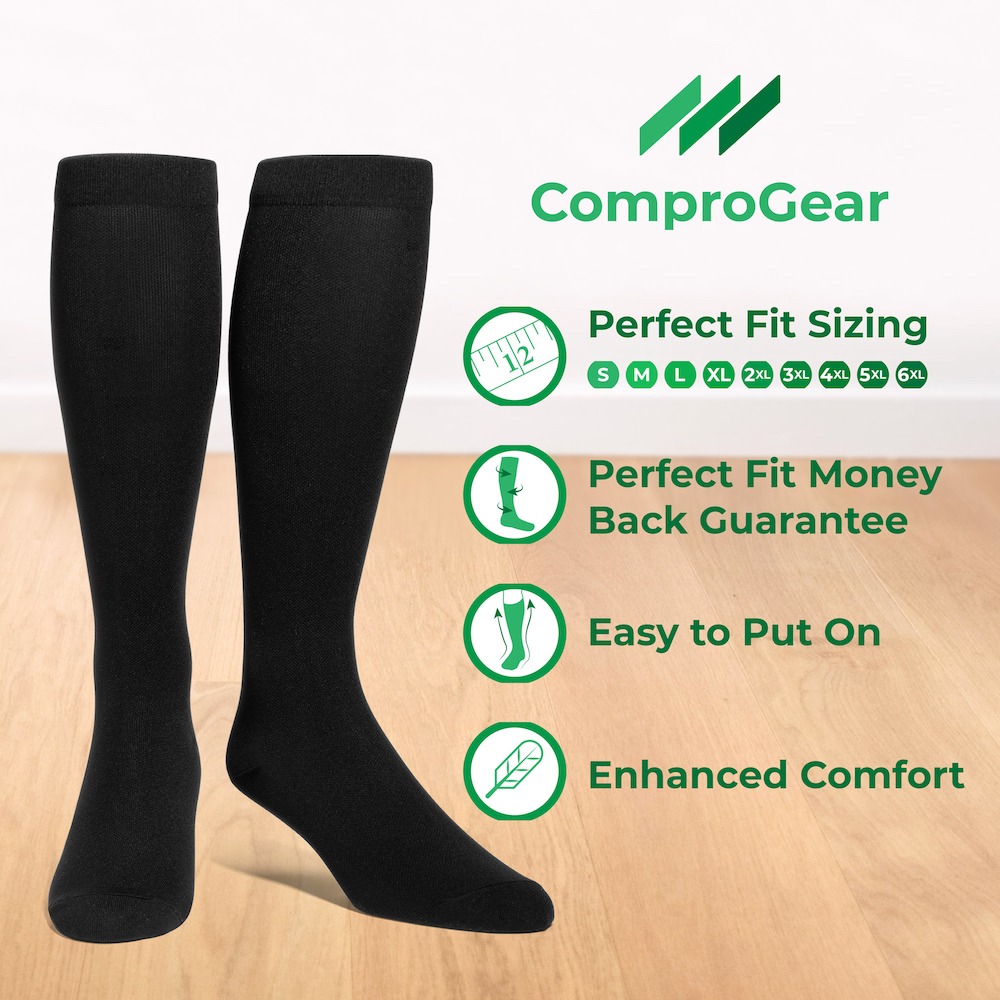If you notice swelling in your ankles after a long day, you’re not alone.
Fluid on your ankles is painful and embarrassing.
When it comes to swelling, it’s essential to find tools to help you get through the day.
But you’re in the right place – compression socks for ankle swelling are effective tools to stop ankle edema fast!
Why should you use compression socks for ankle swelling?
Have you ever used compression socks for your swollen ankles? Those who use compression socks benefit from the relaxing and healing effects.
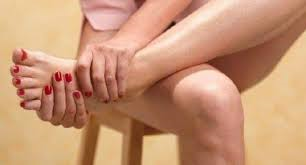
Don’t worry, most ankle swelling is not related to severe health problems. The swelling of the feet and ankles is a common occurrence.
Lifestyle habits can cause the problem, but compression socks for ankle swelling can be the solution!
It usually doesn’t cause problems if it is the result of standing or walking for too long. However, in some circumstances, it may indicate a more serious medical condition.
If you experience any accompanying symptoms that worry you, seek professional medical care immediately.

In medical terms, swelling of the feet, legs, and ankles is called peripheral edema, which means fluid accumulation in these parts of the body.
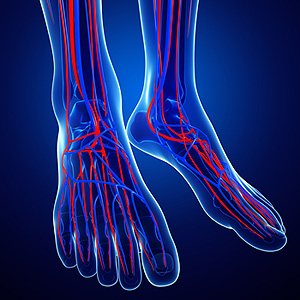
Why does ankle swelling occur?
Swollen ankles occur from sitting, standing, or walking for a prolonged period. Since fluid accumulates in the lowest part of your body, ankles swell.
Fortunately, while the causes of ankle swelling are varied, compression stockings can help in most cases. There are numerous reasons for swelling in the feet, ankle, and legs like daily stress or health-related disorders. Let’s dive in.
What injuries cause ankle swelling?
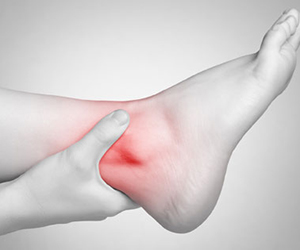
If you injure your foot or ankle, it will likely become swollen. If you fracture your foot or leg, your ankles may swell. It’s possible to rupture your Achilles tendon, as well, which can also cause ankle swelling.
One of the most common foot injuries is an ankle sprain. Spraining your ankle happens when you apply too much force to your ankle, plant your foot on uneven ground, or step awkwardly.
When this happens, you stretch the ligaments that hold your ankle bones together. Ankle swelling occurs because the tissue expands following injury.
Can pregnancy result in ankle swelling?
Absolutely! Some swelling of your feet and ankles during pregnancy is normal. On the other hand, sudden or extreme swelling may be a sign of preeclampsia.
Preeclampsia is a severe condition that manifests itself with high blood pressure and excess protein in the urine after the twentieth week of pregnancy.
If you experience headaches, visual changes, or epigastric (upper abdominal) pain, notify your doctor or midwife immediately.
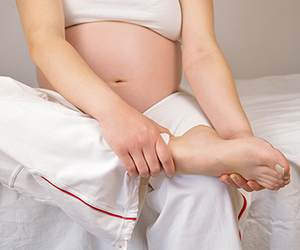
Does chronic venous insufficiency result in ankle swelling?
Chronic venous insufficiency is a medical condition where blood pools in the veins, straining the walls. An early symptom is swelling of the feet and ankles.
In the event of venous insufficiency, blood begins to circulate irregularly through the veins from the feet to the heart.
However, when these valves are damaged or weakened, blood leaks into the soft tissues in the lower legs, ankles, and feet.
Chronic venous insufficiency can cause skin ulcers, infection, or significant skin changes. If you experience these symptoms, consult a doctor ASAP.
Can ankle swelling mean I have a blood clot?
Blood clots in the vessels in your lower extremities can make your ankles swell by preventing the blood in the legs from returning to the heart.
A blood clot can occur close to the surface or buried under the skin. Blood clots that lie far beneath the surface are known as deep vein thrombosis and can block the large veins leading to the leg.
Such blood clots can be life-threatening if they reach the heart or lungs. If you see the signs such as swelling, pain, fever, and changes in the color on one leg or foot, consult your doctor immediately.
Blood clots can be treated with blood thinners, but you must move quickly.
Can medication cause ankle swelling?
Many drugs can cause side effects like the swelling of the feet and ankles.
- These drugs include:
- Hormones such as estrogen and testosterone
- Calcium channel blockers (a blood pressure medication)
- Steroids and corticosteroids
- Certain antidepressants
- Non-steroidal anti-inflammatory drugs (Naproxen sodium or ibuprofen)
- Diabetes medications (thiazolidinediones)

If you think the swelling could be caused by your medications, consult your healthcare provider immediately. If the swelling increases, you may need to stop taking the drug or reduce the dosage.
What else can cause ankle swelling?
Many reasons can cause ankle swelling that we didn’t cover yet, such as:
- excessive weight,
- rheumatoid arthritis,
- edema,
- gout,
- sitting, walking, or standing for a long time.
How do we relieve ankle swelling?
Ankle swelling can be treated according to the underlying cause. In some cases, you may need to change medications, participate in gentle exercise, or lose weight.
Elevating your legs and keeping your feet higher than your heart can promote circulation. Lifestyle adjustments can help reduce your swell such as rest, massage, ice packs, relax in a bath with Epsom salt, or magnesium supplements.
However, one of the best tips is to wear compression stockings to minimize ankle swelling.
How to use compression socks to relieve the swelling?
Compression socks relieve your pain and prevent the accumulation of liquid in your feet, ankles, and legs. They are classified as light, medium, and heavy, in terms of the pressure they apply.
You must choose a pair that is not too tight for your foot.
How do compression socks help?
Compression stockings are tight and long socks that minimize ankle swelling. They provide lighter pressure as they move upward and apply more pressure closer to the feet.
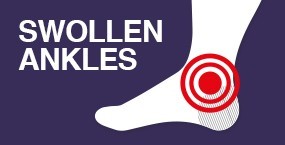
These socks work because they improve blood flow in the veins of the legs that decrease fluid collection. In this way, the blood from your ankles and feet is continuously pumped back to the heart.
This promotes circulation in your legs and prevents blood clots from occurring. These stockings also relieve swelling, decrease pain, and lessen symptoms from chronic vascular diseases and varicose veins.
In short, compression stockings are the gold standard to prevent ankle swelling.
While compression stockings are available in a variety of colors, patterns, and styles, the most important aspect is their purpose. For this reason, the right pressure and size should be chosen first.
Selecting the Correct Compression Socks for Ankle Swelling
Before buying compression stockings, you need to know which type of socks you need. The different types of stockings are defined according to the amount of pressure they provide.

Class I – Relaxing or light pressure socks:
These are the socks used for those who have slight edema in their ankles and feet or mild varicose veins. They usually maintain a lifestyle requiring extended periods of standing or sitting and who wish to use it for prevention.
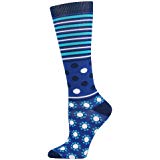
Class II – Medium pressure socks:
These are the compression stockings with slightly more pressure and can be used for individuals with moderate varicose veins, a risk for blood clots in their legs, and pregnant women.

Class III – High-pressure socks:
High-pressure socks are used for those who have wounds on their legs or significant varicose veins.
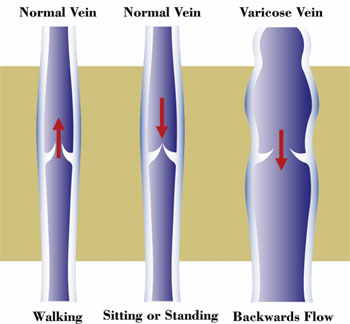
Anti-embolism socks:
Anti-embolism stockings reduce the risk of clot formation before and after surgery.
They can also be used for patients who are bed-bound or have limited mobility. Any patient who is at risk for deep vein thrombosis should consider medical-grade anti-embolism stockings.
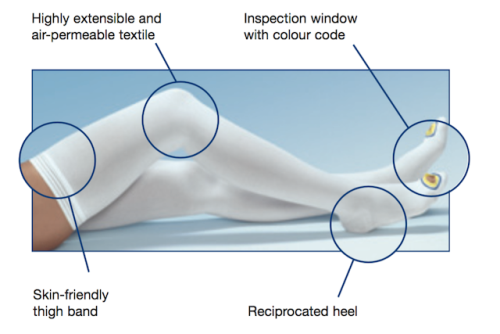
Knee-high compression socks
If you notice ankle swelling, you can try a knee-high compression stocking with only 20-30 mmHg of pressure. For those who walk frequently or have sore legs, these light pressure socks will surely help you relax.
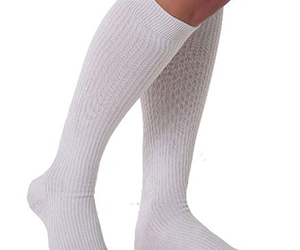
Who Can Wear Compression Socks for ankle swelling?
Generally speaking, there aren’t many drawbacks to wearing compression socks for ankle swelling.
Overall, compression stockings are safe to wear. It’s essential to choose the correct size, wear the stockings without folding them over, and ensure a proper fit.
After learning which type of stocking you need, it’s important to next look at sizing. You can determine the appropriate size for your compression socks by measuring the diameter of your leg at different points.
However, the use of compression stockings may be risky for certain people.
The rare patients who should avoid compression socks are those with peripheral neuropathy, peripheral arterial disease, open skin wounds, and pulmonary edema.
While compression socks are a beneficial product, they should be used with caution and on doctor’s advice.
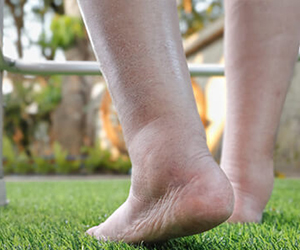
While ankle swelling can be a nuisance, it doesn’t have to interfere with your life. Kick your legs up, rest, and order a pair of compression stockings to help swollen ankles be a problem in your past.
This page last updated December 11, 2022
